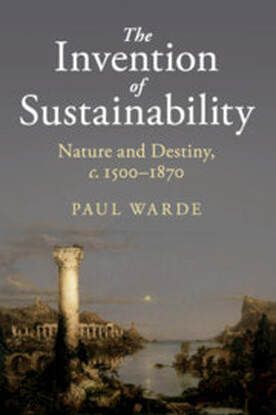The Invention of Sustainability; Nature and Destiny c. 1500-1870
Ray Cunningham's review of Warde's book, which examines the invention of sustainability across different time periods and with different themes

Published by Cambridge University Press, 2018
Full disclosure to begin with: I have had a particular interest in the history of sustainability since I first came across a book on the subject by the German author Ulrich Grober and liked it so much that I translated it into English. His book was first published in 2010 with the original German title ‘Die Entdeckung der Nachhaltigkeit’ – which translates into English as ‘The Discovery of Sustainability’ (though the title finally chosen for the English edition, published in 2012, was ‘Sustainability – A cultural history’; a ‘Green House Gas’ I wrote based on the original book can be seen here).
So I was intrigued to come across Paul Warde’s book ‘The Invention of Sustainability’, particularly given the fact that its title suggests a potentially interesting contrast with the approach taken by Grober – invention as opposed to discovery. And besides, it has to be acknowledged that in the last few years ‘sustainability’ – on everyone’s lips in 2010 – has fallen somewhat out of favour. (Green House’s own John Foster, for example, has written two books highly critical of the term, ‘The Sustainability Mirage’ and ‘After Sustainability’.) Is Warde’s book an attempt to defend or rescue sustainability, or another attack?
The book comes with a sub-title – ‘Nature and Destiny, c.1500-1870’ – which is doubly intriguing. The first part, with its two grand terms, suggests almost infinite scope and ambition for the book, but the second voluntarily constrains its historical scope in a manner for which the rationale is not immediately obvious. And the book’s Introduction fails to directly address the rationale for the sub-title, although it makes it clear that Warde’s principal concern is with ‘early modern Europe and some of its colonial offshoots’, so it seems fair to assume that the historical boundaries are meant to delineate the early modern period, or more accurately perhaps the early modern period plus...a little bit more. In other respects, though, the Introduction makes it clear that Warde is keen to place his work in (modern) historical – or historiographical – context, and to situate it in terms of an ongoing ‘argument’ about sustainability, and even to draw ‘lessons’. I will come back to this ‘situating’ later, but first will outline its historical and thematic coverage.
The main meat of the book is divided into 8 chapters, each covering both a period and a theme. These are: ‘Living from the Land, c.1500-1620’; ‘Governing the Woods, c.1500-1700’; ‘Ambition and Experiment, c.1590-1740’; ‘Paths to Sustained Growth, c. 1650-1760’; ‘Nature Translated, c. 1670-1830’; ‘Theories of Circulation, c. 1740-1800’; ‘Political Economies of Nature, c. 1760-1840’; and ‘History and Destiny, c. 1700-1870’. It will be seen that the themes are broad and indicative (rather than narrowly specific), and indeed increasingly so as the book progresses; and that the periods overlap, which is only appropriate given the breadth of the themes. Closer reading of the chapters explains the themes (or more accurately, the ‘paradigms of knowledge’, as Warde is concerned at least as much with the emergence of academic disciplines and with defining and interpreting knowledge as with the amassing of knowledge itself). Very crudely summarised, the progression is from an understanding of ‘sustainability’ as applying to the soil (at a very localised level), via the woods and the wider, expanding economy, to the idea of the ‘sustainability’ of a nation or a culture, and ultimately to the idea of the sustainability of the ecological conditions for the survival of the human species.
In sketching out this progression, Warde draws on a an enormous range of literature, in several original languages, and shows in impressive and persuasive detail the lines of direct and indirect influence along which knowledge and ideas about ‘sustainability’ were transferred horizontally between writers from across Europe (and into the ‘colonial offshoots’) and vertically from one generation to the next (and sometimes by larger leaps, skipping generations). This is intellectual work which cannot fail to impress by virtue of its breadth, attentiveness, sensitivity to context and nuance, and imagination. Unquestionably, it enriches our understanding of how the idea of sustainability emerged and spread, and how closely – a key point of Warde’s argument – it was synergetic with and dependent on the emergence of the scientific paradigm, of economics (or more accurately, of political economy) and of the modern state. He suggests, in effect, that none of these could have emerged as we know them without the others, and his argument on this point is persuasive.
But what of the wider argument? Does he come to praise sustainability or to bury it? What exactly are the contemporary lessons to be learned? At the end of the book, I’m not entirely sure, on either count. Certainly, in situating his work, he sets himself explicitly against Grober and the rhetoric of ‘discovery’. ‘Sustainability was invented, not discovered…. a new discursive field in science and politics was shaped by many micro-innovations and technologies, and often the bringing together of what were established and banal things in older domains. Yet…because it is a creation of many human minds, it is always a process of negotiation to find out to what we collectively might think it should refer’ (p.334). And again, to emphasise the point: ‘the idea of sustainability is not “discovered”, as if its principles are obvious and one simply requires wise and well-informed people to come upon them (or in declensionist mode, to cause us trouble by forgetting them’ (p. 356). More widely, in Warde’s perspective, no-one is really ‘wise or well-informed’ on this topic (and nor should any be described as ‘fools, monstrously self-seeking, or conveniently self-deluded’); we are all engaged in endlessly re-inventing the ‘problem’ of sustainability as an idea. What he sees as the established narrative – in which sustainability was innately understood in pre-modern times, but then ‘lost’ or overridden by particular interests in the post-Enlightenment world - is therefore a misleading simplification which needs to be corrected. Which means that the usual suspects in that narrative – ‘industrialism’, capitalism’, ‘Western thought’, ‘science’ – are not necessarily the culprits. More widely still, sustainability is not a truth. ‘This is not a normative book: it does not seek to make a judgement on what counts as sustainability. … Rather, my interest is how in its emergence the issue of “sustainability”, as what one might call a “discursive field”, a theme to argue about, was bound to particular social and territorial units, and especially the idea of the state as unit of political, economic and environmental management.’(p.6) Yet more widely still, there is no simple relationship anyway between ideas and lived experience, and to impute any kind of causality would be a mistake: ‘[t]he proposition that thought…is linked in some causal way to the socio-economic “base”, however one sees the direction of causation, is no answer in itself, and is possibly neither true nor untrue. It is like asking if light is a wave or a particle’ (p.14). What, then, is the lesson to be learned from the book? Well, the ‘test of the value of what is written here’ is whether more work is stimulated; and what the author hopes for most of all is that the reader may be drawn to the conclusion ‘that the way in which sustainability was framed has meant that many different kinds of argument of what constituted sustainability could emerge within this field’.
As a non-historian I cannot judge if this is an accurate reflection of the tenor of intellectual history in the academy today; but these two aspirations seem to me to constitute a strikingly modest ambition (‘more research needed’; the conclusion that ‘it’s complicated’), and beyond that a surprisingly relaxed response to the current ‘polycrisis’ now impacting on all of us - even (though perhaps not as immediately) on those in the academy. And even just in terms of the symbolic dispute over whether sustainability was ‘discovered’ or ‘invented’, it seems to ignore the obvious point that Grober’s use of the term is rhetorical, with the purpose of establishing a narrative which enables us to understand the practical impacts of how we think about the world, and then to act on that understanding. In other words, that it is a political intervention.
Warde is not arguing (at least, I don’t think he is) that sustainability does not exist, or is meaningless. In his Introduction, he is at pains to avoid a definition of the term, but does instead offer a description of how he proposes to use it in this book: he understands it as ‘framing both the problem that people may behave inappropriately in regard to the limits of the environment which they inhabit, and that the environment is changed by the society dependent on it so that society can no longer sustain itself.’(author’s emphases) This seems clear enough, and it is only fair to say that the book succeeds in tracing via a vast range of literature and an extensive timespan the tortuous path by which these understandings come to be widely accepted. In itself, this is a massive achievement, and I have no doubt that it enhances our understanding of the ‘problem’, of the ‘discursive field’ that is sustainability. But to what purpose? Despite the promise inherent in the sentence above from the Introduction, at no point does Warde identify ‘inappropriate’ behaviour in regard to the limits of the environment, or the limits beyond which a society moves into unsustainability. It is a book without a villain, and in that sense devoid of politics (or perhaps better of politicians, in the villainous Shakespearean sense). It seems to be still living in a world in which we can be comfortable in the conviction that knowledge for its own sake is sufficient justification.
Warde’s instinct seems to be to avoid drawing any practical or political consequences as long and as far as he possibly can, in the belief that ever more detailed understanding of how ideas emerge and are transmitted will enable us all to understand each other better and thus to ultimately coalesce as a unified community of understanding, one which presumably will automatically do politics right as a result. At worst, this kind of history can slip into a kind of ultra-relativism which risks reducing intellectual life to an exercise in constructing ever smaller categories with ever finer distinctions of ever-diminishing practical import; and hence almost emptying it of moral consequentialism – ‘tout comprendre, c’est tout pardonner’. Infinite particularism of this kind could be accused – ironically enough, given the acknowledged significance of forestry in the history of sustainability – of obscuring the wood by focusing so relentlessly on the individual trees. It could even be argued that it is a form of denialism, in which sustainability – and by extension its opposite, unsustainability – are no more than ‘inventions’, or ‘discursive fields’. And although he may be right that understanding each other is the best route to salvation, and at the risk of being accused of the worst kind of instrumentalist anti-intellectualism, I do wonder if we still have time to take that route? I find myself uncomfortably reminded of Marx’s famous dictum (which can be read in the entrance hall of the Humboldt University in Berlin) that ‘the philosophers have only interpreted the world, in various ways. The point, however, is to change it’.
On a more prosaic final note, it is disappointing and frustrating to find that a book published by Cambridge University Press is littered with small typographical and syntactic errors which cause the reader to stumble and thus interrupt the flow of understanding, and which really ought be picked up in the copy-editing process. But then, perhaps the publisher could argue that the issue is so important and so urgent that the time required for copy-editing can no longer be justified?



